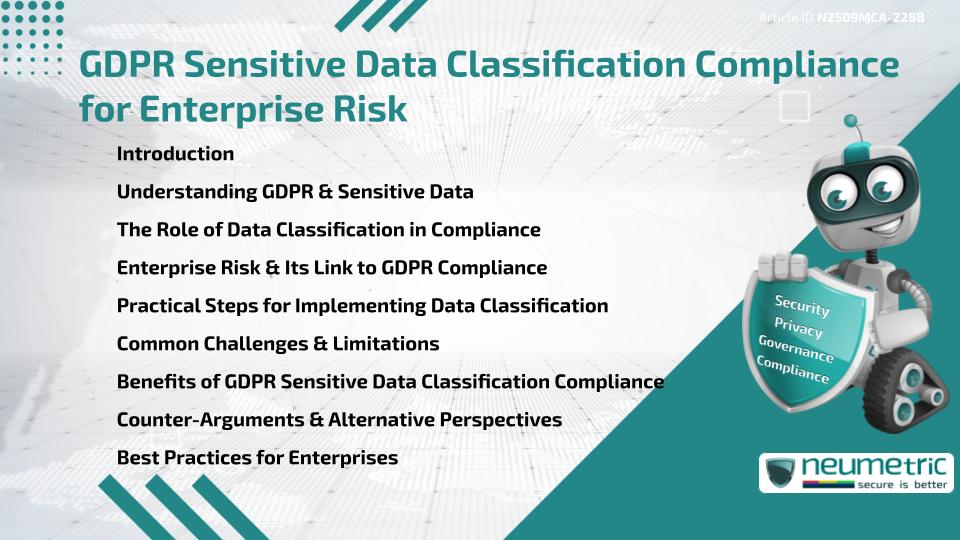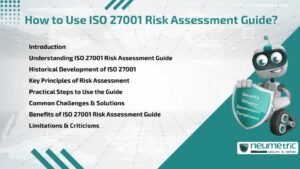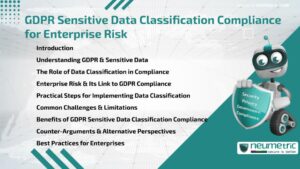Table of Contents
ToggleIntroduction
GDPR Sensitive Data classification compliance is a core requirement for Organisations handling Personal Data within or connected to the European Union. It ensures enterprises can properly identify, categories & secure Sensitive Data to reduce Risks of breaches, fines & reputational damage. By combining clear data classification Policies with enterprise Risk Management, businesses achieve stronger accountability, transparency & resilience. This article explores what GDPR Sensitive Data classification compliance involves, why it is critical for enterprise Risk, the challenges Organisations face & the practical steps they can adopt for effective implementation.
Understanding GDPR & Sensitive Data
The General Data Protection Regulation [GDPR] defines Sensitive Data as information that reveals aspects such as racial or ethnic origin, political opinions, religious beliefs, genetic data, biometric identifiers, health information or sexual orientation. Handling this type of data requires stricter protection measures.
Unlike general Personal Data, Sensitive Data triggers higher Risk if compromised. For example, leaking biometric identifiers could allow permanent misuse. Therefore, compliance frameworks demand accurate classification to determine where Sensitive Data exists & how it must be handled.
The Role of Data Classification in Compliance
Data classification is the foundation of GDPR Sensitive Data classification compliance. It enables enterprises to:
- Discover where Sensitive Data is stored
- Categorize it according to sensitivity level
- Apply safeguards such as encryption, access restrictions & pseudonymization
- Audit data flows to prevent unauthorized transfers
Without classification, Organisations cannot prove they know what data they hold or apply proportional security. Much like organizing valuables in a bank vault, classification ensures the most sensitive assets receive the strongest protection.
Enterprise Risk & Its Link to GDPR Compliance
Non-compliance with GDPR exposes enterprises to severe Risks. Fines can reach up to four percent (4%) of global annual turnover. Beyond penalties, reputational loss & erosion of Customer Trust pose even greater long-term Risks.
By embedding GDPR Sensitive Data classification compliance into enterprise Risk Management, Organisations create a proactive defense. This integration allows boards & executives to measure data Risks alongside financial, operational & legal Risks. It transforms compliance from a regulatory checkbox into a strategic advantage.
Practical Steps for Implementing Data Classification
Enterprises can follow structured steps for effective data classification:
- Data discovery – Use automated tools to locate Sensitive Data across systems.
- Classification policy – Define clear categories aligned with GDPR definitions.
- Access Controls – Limit Sensitive Data to authorized staff only.
- Technical safeguards – Apply encryption, anonymization & monitoring
- Training – Educate staff to handle Sensitive Data responsibly.
- Auditing – Regularly review compliance & document Evidence for regulators.
Resources such as ICO guidelines & CNIL offer practical direction.
Common Challenges & Limitations
Organisations often struggle with fragmented systems that store Sensitive Data across multiple locations. Legacy applications may not support modern classification tools & manual processes can be prone to error.
Another challenge is balancing compliance with business agility. Excessive restrictions may slow down operations or frustrate Employees. Thus, enterprises must design classification strategies that protect Sensitive Data without stifling efficiency.
Benefits of GDPR Sensitive Data Classification Compliance
Compliance brings several benefits:
- Reduced Likelihood of costly breaches
- Stronger trust from Customers & partners
- Demonstrated accountability to regulators
- Streamlined data Governance processes
Much like quality assurance in Manufacturing, classification improves consistency & reduces the chances of defects — in this case, data breaches.
Counter-Arguments & Alternative Perspectives
Some critics argue that classification frameworks are expensive & time-consuming. They believe investing in advanced encryption or anonymization alone may suffice.
However, encryption without classification is like locking random boxes without knowing what is inside. Classification provides the visibility needed to ensure safeguards are applied correctly.
Best Practices for Enterprises
To achieve GDPR Sensitive Data classification compliance effectively, enterprises should:
- Appoint a Data Protection Officer [DPO] to oversee compliance
- Integrate classification into enterprise Risk Management systems
- Automate processes where possible to reduce manual errors
- Continuously update Policies to reflect evolving business processes
Guidance from European Data Protection Supervisor helps enterprises align practices with regulatory expectations.
Conclusion
GDPR Sensitive Data classification compliance is not only about avoiding fines. It strengthens enterprise Risk Management, builds Customer Trust & secures Sensitive Information that defines organizational integrity.
Takeaways
- GDPR requires special protection for Sensitive Data categories.
- Classification is essential to identify & secure such data.
- Non-compliance creates financial, reputational & operational Risks.
- Effective compliance requires technical tools, Policies & staff training.
- Integrating compliance with enterprise Risk Management enhances resilience.
FAQ
What is GDPR Sensitive Data classification compliance?
It is the process of identifying, categorizing & protecting sensitive Personal Data to meet GDPR requirements & reduce enterprise Risk.
Why is data classification important for GDPR?
Classification ensures Organisations know what Sensitive Data they hold & can apply appropriate safeguards, audits & accountability.
What are examples of Sensitive Data under GDPR?
Examples include genetic information, biometric data, health details, political opinions & religious beliefs.
How does compliance reduce enterprise Risk?
It prevents costly fines, reputational damage & operational disruptions by safeguarding Sensitive Data effectively.
What challenges do Organisations face in implementing compliance?
Challenges include fragmented IT systems, manual processes, legacy applications & balancing security with operational efficiency.
Can encryption alone ensure GDPR Compliance?
No. Encryption is vital but without classification Organisations cannot prove which data needs protection or if safeguards are applied properly.
Who oversees compliance in enterprises?
A Data Protection Officer [DPO] often manages compliance processes & ensures alignment with regulatory requirements.
Need help for Security, Privacy, Governance & VAPT?
Neumetric provides organisations the necessary help to achieve their Cybersecurity, Compliance, Governance, Privacy, Certifications & Pentesting needs.
Organisations & Businesses, specifically those which provide SaaS & AI Solutions in the Fintech, BFSI & other regulated sectors, usually need a Cybersecurity Partner for meeting & maintaining the ongoing Security & Privacy needs & requirements of their Enterprise Clients & Privacy conscious Customers.
SOC 2, ISO 27001, ISO 42001, NIST, HIPAA, HECVAT, EU GDPR are some of the Frameworks that are served by Fusion – a SaaS, multimodular, multitenant, centralised, automated, Cybersecurity & Compliance Management system.
Neumetric also provides Expert Services for technical security which covers VAPT for Web Applications, APIs, iOS & Android Mobile Apps, Security Testing for AWS & other Cloud Environments & Cloud Infrastructure & other similar scopes.
Reach out to us by Email or filling out the Contact Form…





